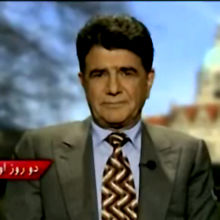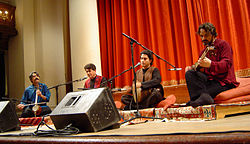- Mohammad-Reza Shajarian
-
Mohammad Reza Shajarian 
Shajarian in an interview with VOABackground information Birth name Mohammad Reza Shajarian Born September 23, 1940
Mashhad, Razavi Khorasan, IranOrigin Mashhad, Razavi Khorasan, Iran Genres Persian traditional music Occupations Composer, singer, university professor Years active 1959–present Website www.delawaz.com Mohammad-Reza Shajarian (Persian: محمدرضا شجريان) (born September 23, 1940 in Mashhad, Iran) is an internationally and critically acclaimed Persian traditional singer, composer and ostad (master) of Persian music.[1][2][3] He has been called "Iran's greatest living master of traditional Persian music."[4] Shajarian is also known for his skills in Persian calligraphy, and humanitarian activities.
Shajarian has collaborated with Parviz Meshkatian, Mohammad Reza Lotfi, Hossein Alizadeh, and Faramarz Payvar. He is recognised as skilled singer in the challenging traditional Dastgah style. In 1999 UNESCO in France presented him with the Picasso Award and in 2006 with the UNESCO Mozart Medal.
Contents
Early work
Shajarian studied singing at the early age of five under the supervision of his father, and at the age of twelve, he began studying the traditional classical repertoire known as the Radif. Shajarian started his singing career in 1959 at Radio Khorasan, rising to prominence in the 1960s with his distinct style of singing. Since then his career has included teaching at Tehran University's Department of Fine Arts, working at National Radio and Television, researching Iranian music, and making numerous recordings.
Music groups
Shajarian has not always been in music groups, but he currently does the vocals for the Masters of Persian Music with his son Homayoun Shajarian, as well as two other ostads, Kayhan Kalhor and Hossein Alizadeh. He also performs with his daughter Mozhgan Shajarian.
In 2008, he toured the world with the Ava Ensemble, composed of his son Homayoun (tombak and vocals), Hossein Behroozinia (barbat), Majid Derakhshani (tar), Hossain Rezaeenia (daf), and Saeed Farajpouri (kamanche).[5]
Significant Works
- Raast-Panjgaah concert with Mohammad Reza Lotfi in Raast-panjgaah (1976).
- Be yaad e Aaref with Mohammad Reza Lotfi in Bayaat e Turk (1986).
- Sepideh Album with Mohammad Reza Lotfi and the Sheydaa Ensemble in Maahoor.
- Bidaad with Parviz Meshkatian and the Aref Ensemble in Homaayoun (1985).
- Aastaan e Jaanaan with Parviz Meshkatian and Naaser Farhangfar in Sur (1982).
- Nava - Morakkab Khani with Parviz Meshkatian and the Aref Ensemble in Navaa, Se-gaah and Dashti (1986).
- Dastan with Parviz Meshkatian and the Aref Ensemble in Chahaar-Gah (1987).
- Dastgah Chahargah (live version of Dastan) concert with Parviz Meshkatian and the Aref Ensemble recorded live in Bonn (1987)
- Cheshmeye Noush with Mohammad Reza Lotfi in Raast-panjgaah.
- Shab, Sokoot, Kavir with Keyhan Kalhor based on the folk music of Khorasan (2000).
- Without you with the Masters Ensemble in Navaa and Bayaat e Kord (2002).
- Faryaad with the Masters Ensemble in Raast-panjgaah (2003).
- Eshgh Daanad with Mohammad Reza Lotfi in Aboo Ataa (1981).
- Chehre be Chehre with Mohammad Reza Lotfi in Navaa (1977).
- Serr-e-Eshgh with Parviz Meshkatian and Mohammad Mousavi in Maahoor.
- Doud-e-Oud with Parviz Meshkatian and the Tehran Symphonic Orchestra in Navaa (1987).
- Zemestaan Ast with Hossein Alizadeh and Keyhan Kalhor in Maahoor and Homaayoun (1999).
- Dar Khiaal with Majid Derakhshani in Segaah (1995).
- Night Silence Desert, with Kayhan Kalhor. Traditional Crossroads, 2000
Masters
Shajarian studied with Esmaeil Mehrtash, Ahmad Ebadi, and Nour-Ali Boroumand and learned the vocal styles of previous generations of singers such as Seyed Hossein Taherzadeh, Reza Gholi Mirza Zelli, Ghamar Molouk Vaziri, Eghbal Azar , and Taj Isfahani. He started playing the santour under the instruction of Jalal Akhbari in order to better understand and perform the traditional repertoire. In 1971, he was introduced to Faramarz Payvar and took santour lessons with him. Shajarian also learned Abolhasan Saba's vocal radif from Payvar. He also studied under the guidance of master Abdollah Davami, from whom he learned many early Persian songs. Abdollah Davami also passed on to Shajarian his own interpretation of the Radif.
Bam Art Garden project
After the 2003 Bam earthquake, Shajarian initiated a project to help the people of Bam. He also performed concerts in support of people of Bam.
2009 election protest
Shajarian has indicated support for Iranians protesting against the 12 June 2009 Iranian presidential election results. When Iran's president, Mahmoud Ahmadinejad referred to the protesters as "dust and trash", Shajarian told a BBC BBC Persian channel telephone interviewer that he (Shajarian) considered himself the voice of dust and trash: "It is the voice of dust and trash and it will always remain the voice of dust and trash." He also asked IRIB (Islamic Republic of Iran Broadcasting) to stop broadcasting his songs. He mentioned that his famous song "Iran, Ey Saraye Omid" (Iran, the land of Hope), has no relation with the current situation of his country.
Lyrics of his song "Language of Fire," issued in September 2009, — "Lay down your gun, Come, sit down, talk, hear. Perhaps the light of humanity will get through to your heart too" — are thought by some observers to speak "directly to the plainclothes Basiji militiamen and security forces" who beat protesters during recent unrest.[4]
Awards and distinctions
- One of NPR's 50 great voices.[6] (2010)
- Nushin medal (2008)
- The UNESCO award - the UNESCO Mozart Medal[7] (2006)
- Nominated for Grammy award in Best World Music (2006)
- Nominated for Grammy award in Best World Music (2004)
- Iran’s best classical vocalist (2000)
- Golden Picasso Medal (1999), one of UNESCO's highest honors
- National radio and television golden cup (1977)
- Prize presented by Turkish parliament speaker (1976)
Notable students
- Hamid Reza Noorbakhsh
- Homayoun Shajarian
- Iraj Bastami
- Mojgan Shajarian
- Shahram Nazeri
See also
- National Iranian Symphony Orchestra
- Music of Iran
- List of Iranian musicians
References
- ^ Master of Persian Classical Music: Mohammad Reza Shajarian
- ^ Mohammad Reza Shajarian
- ^ Asia Society
- ^ a b IRAN: Famous singer Shajarian decries 'Language of Fire,' September 6, 2009 Ramin Mostaghim in Tehran and Borzou Daragahi in Beirut
- ^ http://www.canada.com/vancouversun/news/westcoastlife/story.html?id=5bf0c258-be0c-43d5-aa57-4fe6613b6e6c
- ^ Mohammad Reza Shajarian: Protest Through Poetry
- ^ روزنا
Sources
- Laudan Nooshin, in The New Grove Dictionary of Music and Musicians, edited by Stanley Sadie, second edition (Macmillan, London, 2001). ISBN 1-56159-239-0. (Oxford University Press, 2001). ISBN 0-19-517067-9.
External links
- Delawaz Records Website with pages of biography, discography, news and schedules of the artist.
- Mohammad Reza Shajarian
- Mohammad Reza Shajarian and Radif
- Shajarian Receives UNESCO's Mozart Medal
- Mohammad-Reza Shajarian The Master Rebel
- Mohammad Reza Shajarian: Protest Through Poetry from NPR's "50 Great Voices" series
Categories:- 1940 births
- Living people
- Iranian classical vocalists
- Iranian humanitarians
- Iranian male singers
- Iranian musicians
- Music educators
- People from Mashhad
- Persian classical musicians
- University of Tehran faculty
- Car collectors
Wikimedia Foundation. 2010.

